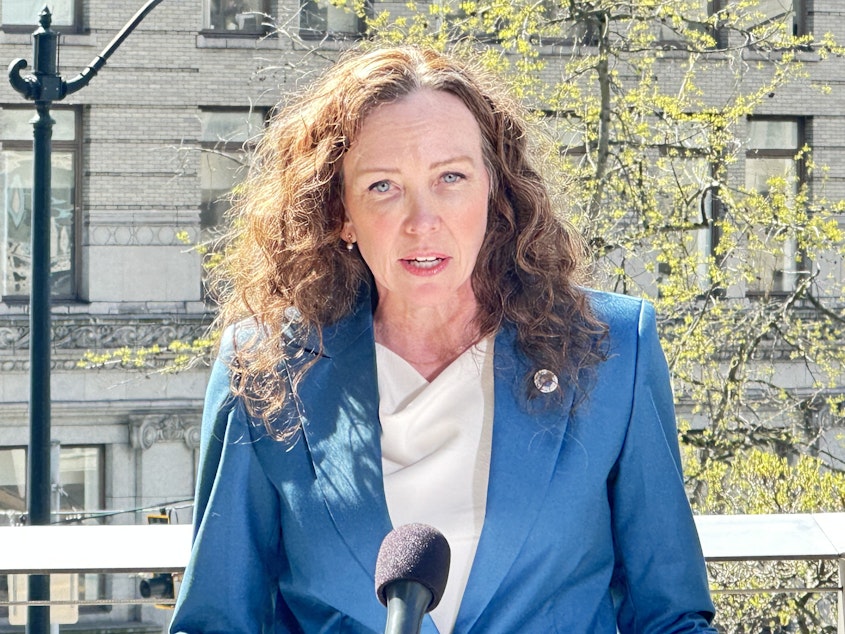Seattle’s city attorney stumps for newly passed SODA and SOAP laws

A nearly unanimous Seattle City Council passed two public safety bills this week. The “stay out of area” laws are aimed at banning certain types of illegal activity from specific areas of the city. One seeks to address prostitution on Aurora Avenue. Another focuses on drug use in six locations around the city.
Seattle City Attorney Ann Davison told KUOW’s Kim Malcolm why she supports both pieces of legislation.
This interview has been edited for clarity.
Kim Malcolm: Why are you calling for this approach to focus on particular geographic boundaries?
Ann Davison: This is based on data where we have tracked the referrals we get from the Seattle Police Department, which show where the highest impact for criminal activity related to these types of crimes is located.
Couldn’t enforcing laws in just these specific areas push the problems elsewhere?
It has that likelihood, but it is not enough of a reason to not act. Particularly related to the SODA zones that I originally proposed in downtown, and in the International District. These are entrenched, sadly, well-known open-air drug markets that need disruption as soon as possible.
Sponsored
There are some critics of this approach who are pointing out that there's no money attached to these bills to connect survivors with services. Councilmember Tammy Morales was the only no vote on both of these bills. She put out a statement saying they would not provide meaningful solutions. She called them “performative” and “band aids.” What’s your response to that?
I agree that we need to have services, and that’s what they need to do as money appropriators when they go through the budget process. For me, my role is to enforce the laws we have that are a reflection of our values as society, that say these are designated as criminal acts. We want to improve public safety for everyone in these public spaces so that they are accessible and safe for everyone who wants to travel through them. That's the main goal of this legislation.
Is this going to mean a change in workflow for the folks in your office to address what I'm assuming are going to be a new raft of possible referrals coming your way?
It will be some additional new things that we will have to look at. But my people are used to me coming in now using data to drive my decision making, and they can see why these things are important, and we all want to see an improvement in public safety in the city. This is where we can start in these known areas with problematic criminal activity.
A Seattle police spokesperson told us that these bills will provide more opportunities “interrupt cycles of significant public disorder.” What are you expecting enforcement is going to look like?
Sponsored
Well, I don't direct the police, as you know, but I think it gives them additional ways that they can do what we ask of them. We ask them to do some difficult work, and we're just wanting to be creative and strategic in how can we help them do that work. And this is one way that they can do that, then send that referral to me, and if the evidence is there, then we will proceed with our role.
What are you going to be looking at to decide if this approach is a success?
Well, I appreciate that question a lot, Kim, because again, I'll be using data. That to me is the only way that anyone in a position like I'm in should be making our decisions, based upon what the data is showing us. We will look at the amount of referrals, the types of crimes that are in those referrals. We will be listening to the people who live and work in the zones and outside the zones. If we see a reduction, if we are seeing that we have done some disruption, and if we see that the workers and residents and people who are around those areas feel that things are getting safer, that will be part of the success.
We also hope people have the opportunity to get into treatment and have access to services, but again, the primary, most immediate goal for this legislation is to enhance public safety for those areas and do the disruption of the known criminal enterprises.
What's your time frame for assessing the data as it comes in? When will you step back and look at what's happened to decide how to move forward from there?
Sponsored
Well, my data starting point is at the referrals from the Seattle Police, so it can't start until I have a number of those referrals. Once I start to accumulate those, I will be able to do that assessment.
What else do you want to add about this legislation?
I do think it's a great show that this is across different branches of government, that we are looking at how we can collaborate together. It's not a perfect one-stop shop. This isn't the solution for every issue. It's not intended to be, but at least it shows, I hope, that the public sees that we are working together as leaders, that we hear them, we acknowledge the issues that they are facing day in and day out in their neighborhoods. This is about how can we make the City of Seattle be available, accessible, safer for everybody who wants to enjoy it.
Listen to the interview by clicking the play button above.





